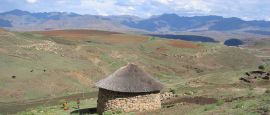Lesotho: Doing business & staying in touch
Doing business in Lesotho
A lightweight suit, shirt and tie should be worn for business meetings. English will be spoken by most businesspeople. Usual business formalities should be observed, but expect a casual atmosphere and pace.
The earnings of the estimated 150,000 Lesotho nationals working in South Africa account for a substantial proportion of the country's income. Inside the country, 86% of the workforce is engaged in agriculture.
Lesotho's vulnerability to drought means that over half the country's food must be imported from South Africa.
There are reserves of ores and minerals, including diamonds and uranium, but little exploitation has taken place.
Lesotho's government has historically relied on foreign aid, particularly for infrastructure programmes, the most important of recent years being the Lesotho Highlands Water Project. This aims to deliver water to South Africa and provide 60% of Lesotho's electricity supply.
Keeping in Touch in Lesotho
Roaming agreements exist with a few international mobile phone companies. Coverage is limited to main urban areas.
The government operates a range of media. South African radio and TV stations can also be received. Reforms in 1998 led to commercial radio stations but state-run Radio Lesotho is the only national station. Due to high printing costs, radio is the most important form of mass communication.
The private press often carries opposition views, but publications and journalists are regularly targeted by defamation lawsuits.
MoAfrica and Mohlankaare published weekly in Sesotho whilst The Mirror and Public Eye (http://www.publiceyenews.com/) are published weekly in English.








 You know where
You know where